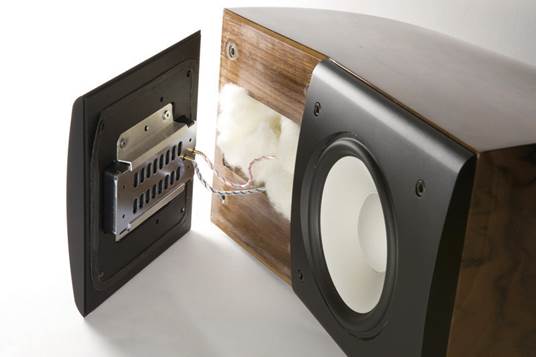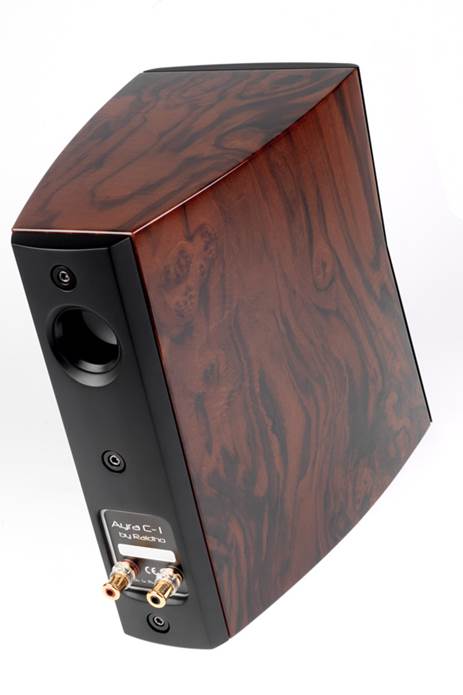Sound quality
From the first bar of the first phrase of
the first piece of music you play, it is clear that the Raidho C1.1 is a
special loudspeaker, making a very good job of dissolving into the middle
distance, letting the music’s flavor flood out. Because it’s so small, it has
no issues of bass overhang. The ported cabinet is obviously super-stiff,
because there’s not the faintest whiff of low frequencies being given undue
license to impose themselves on the overall performance. Rather, the Raidho
reins the bass in – as the chugging sequenced electronic low notes of The
Beloved’s Time After Time show. While many larger boxes get bogged down in
communicating how the bass line modulates up and down the scale, the C1.1 gives
a crisp, clear rendition of the tune the bass synth is playing, but doesn’t
fall over its own shadow attempting to convey the full power of the thing.

It’s
so small, it has no issues of bass overhang
The midband is this speaker’s real
tour-de-force. It is wonderfully open – no small thanks to that treble unit,
which reaches down lower than many. There’s little sense of listening to two
drivers at the same time, as they cross over so well to provide a searching and
insightful window into the mix. The speed of it all is dazzling, and the C1.1’s
dynamics are excellent, too. The result is that you can cue up a slice of jazz
funk like Deodato’s Uncle Funk and get an incredibly resolved performance,
these speakers digging unexpectedly deep into the recording to reveal its every
nuance. Sound staging is excellent, images hovering in space in an almost
ethereal way and locked in position with great precision.

the
C1.1 gives a crisp, clear rendition of the tune the bass synth is playing, but
doesn’t fall over its own shadow attempting to convey the full power of the
thing
The C1.1 can dazzle with its technical
virtuosity, but how does it fare with far less ‘hi-fi’ programmer material. In
a word, superbly; playing an old Sniff ‘n’ the Tears track, Driver’s Seat, I’m
really surprised by the musical fluency that greets me. This isn’t a great
recording, but the Raidhos don’t mind, locking on to the rhythms instead, working
on the emotional impact of the track. They’re fast but subtle, refusing to
shout at you and push everything into your face – dynamically they’re really
very good at those ‘grey scales’, signposting precisely the energy with which
the drum skin is hit or the bass guitar string is plucked. This is the sort of
sound you can only get when a loudspeaker is truly self-effacing, imposing
relatively small amounts of its physical presence on the sound.
Subtle as the C1.1s may be, they are not
invisible. There is a slight tonal fingerprint they stamp on the proceedings.
Essentially they have a light, bright, spacious personality with an open top
end – cymbals sparkle out of the darkness, female vocals shimmer and electric
guitars ring. You’d never call it ‘bright’, but it’s certainly not dull – you
don’t get a sense of a cloth dome tweeter damping off the higher harmonics of
the music, like a great big acoustic curtain. This makes it a joy with
classical music. On a DG recording of Beethoven’s Pastoral Symphony, massed
violins have a lovely wiry feel that leaps right out of the recording, instead
of being dull and damped.
Conclusion
A marvelously entertaining speaker to
listen to, the Raidho C1.1 is largely devoid of character. It doesn’t do much
to the music it is asked to make, preferring instead to present the whole,
unvarnished truth. Of course, it’s a small stand mounting design with limited
low bass, but somehow this doesn’t intrude on the overall listening experience,
as the speaker itself is so lyrical and lucid. It fizzes with energy, making
the music sound as vivid as it has a right to. At around $16,350 including
bespoke stands, it ought to sound good – but even at this price it seems a fine
buy. Well worth an audition then, if you’re in the happy position to be able to
contemplate owning a pair!
In sight
1. Planar-magnetic tweeter
2. Bass reflex port
3. Bespoke speaker binding posts
4. Ceramic coated alloy

In
sight
Setting up
There’s no direct rival to the Raidho C1.1
in terms of cabinet dimensions or price, but one of the closest speakers in
intent is the Vivid V1.5. This $9,375 stand mounted is from the mind of a
gifted ex-B&W designer involved in the Nautilus project. However, the Vivid
is an altogether more real-world, user-friendly design. It shares the Raidho’s
interesting approach to drive units; although there’s no ribbon tweeter both
mid/ bass and treble units are magnesium alloy, and blend beautifully to give a
seamless wider-angle sound with super-fast attack transients (although the
Raidho is faster still). Its cabinet is more innovative, being a rounded oval
profile made from carbon fiber reinforced polyester molding, and given an
integral stand. Like the Raidho it’s searchingly detailed and wonderfully open
with a lovely rhythmic gait to it, too. But the (more expensive) C1.1 is even
more detailed and incisive and just a little more polished, too. Both need a
reasonably powerful solid-state amplifier, although the slightly more sensitive
Vivid will let you get away with a little less muscular tube design should you
wish. The Raidho will make a nice noise with a valve amplifier, but it will
have to be a powerful one.
Our verdict
·
Sound quality: 5/5
·
Value for money: 5/5
·
Build quality: 5/5
·
Ease of drive: 4.5/5
·
Like: Translucent sound; blistering transients;
fine dynamics; superlative build
·
Dislike: Price; limited bass extension; needs
powerful amplifier for serious levels
·
We say: Expensive yes, but one of the very best
small stand mount loudspeakers on sale today
·
Overall: 5/5
|
Raidho C1.1 Specs
·
Origin: Denmark
·
Type: Stand mount loudspeaker WEIGHT: 12.5kg
·
Dimensions: (W x H x D) 200 x 370 x 360mm
·
Features: Sealed ribbon high frequency driver;
115mm ceramic mid/bass driver; Recommended amplifier power: >50W
|